Trouble in paradise.

Lochmarin
Sat 3 Sep 2016 04:33
04:13.728s 152:27.332e  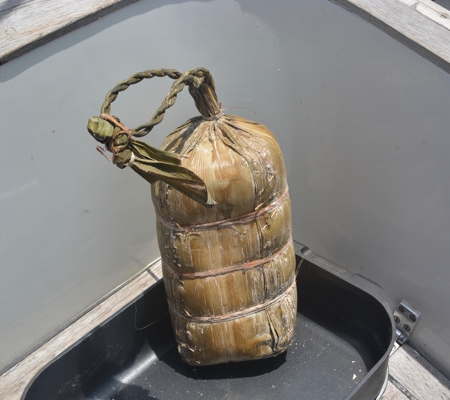 Some results of our marketing in Kokopo - Big Chief Phil with his pig’s tusks and sago, which we bought as much for the wonderful packaging as for the flour itself. We’d done our marketing and got our port-to-port clearance from customs, it was time to move on but there was no wind. We decided to make a small hop and motor the 12 miles to the Duke of York Islands, tuck in there in Mioko Harbour and wait for some wind before moving on up the coast of New Ireland. 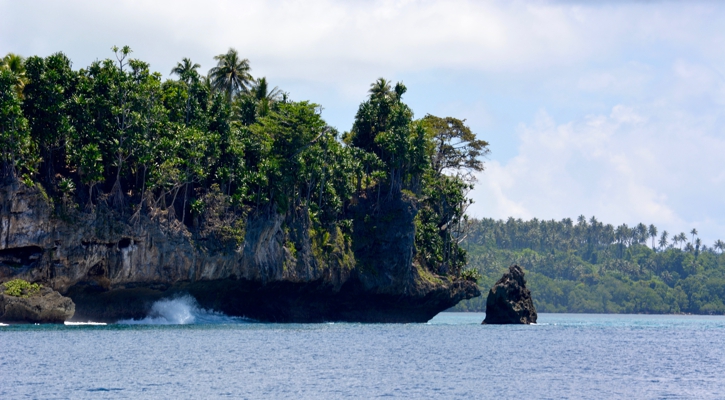 As you come in through the pass the windward side of the islands are undercut cliffs, with caves, some of which had simple wooden sticks forming a barricade across the opening - shelters for fishermen I assumed. But inside the reef sandy shores creep out from the palm trees, where children play and women wash pots and clothes. Phil saw a dugong dive deep for eel grass, it’s split tail lifting high. It looked idylic. 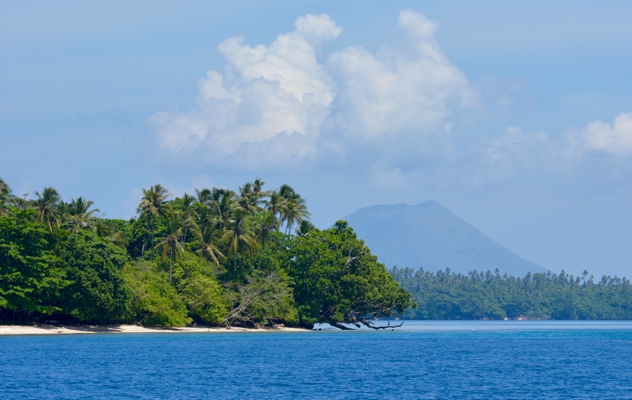 Rounding the North of Mioko Island, with Rabaul’s volcano in the background. 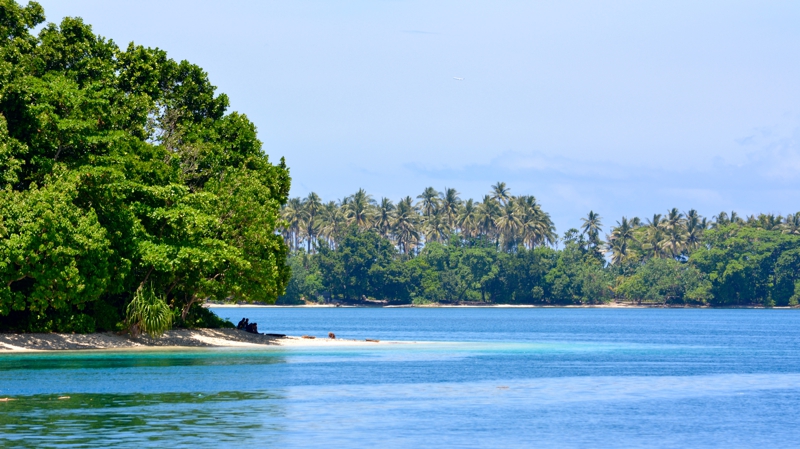 Turning into the anchorage. We anchored quite close to the shore, as it’s safer to be in sight of a village, but it did mean we had a busier anchorage than we’d experienced for a long time. The kids were shouting and squawking as they played, local motor boats, about 23ft long but only 6ft across, called dinghies by the locals, zoom across from the other islands, looking dangerously over laden with people going to and from the gardens and other villages. In the evening, just like in Erromango, Vanuatu, a preacher could be heard on a loud speaker system, getting extremely worked up and even speaking in tongues. After he’d finished, around 10pm or so, drums beat well into the small hours, reminding me of festivals as I drifted in and out of sleep. 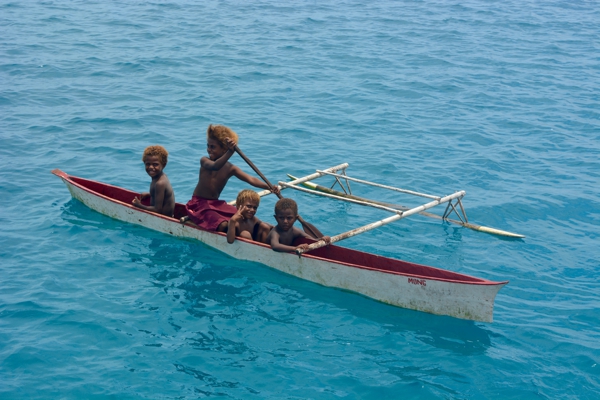 Little visitors. Children as young as 11 or 12 bring 2 and 3 year olds out on the canoes. Next day we went ashore to say hello and look around. A few folk had come out on canoes to greet us but we’d been mostly left alone. We stopped on our way and spoke to a lady who was having a swim. She warned us that a mask was walking around the village, if we saw it we must stay away from it, it was taboo for women and children to see it. We had heard of Duk Duk, in fact we’d sent postcards from Rabaul with Duk Duk dancers on but we’d thought it was a thing of the past, no longer practised, just brought out to entertain the tourists. Duk Duk was a sort of religion, worshiping the gods that the masks depicted, but also a secret society, just for men, who made the laws and extracted fines and gave out punishment. Transactions were all in the local shell money - small cowrie shells strung on thin cane. We’d seen this money for sale in the market and Lucas had told us it was still in use. We’d also seen huge rings of it, made of hundreds of feet of strung shells woven together, that was for bride prices. Punishments could include burning houses or killing people. Sure enough as we walked, with our usual entourage of children, a man could be seen approaching in traditional dress and behind him another man wearing a Duk Duk mask was coming. The mask looks a bit like he’s wearing a very long umbrella on his head as it’s a tall thin cone with a sort of white fibre skirt, like a ruff over his head and shoulders. The rest of his body is covered with leaves so only his ankles and feet poke out below. We couldn’t get any photos as we had to run away - even Phil as he’s not an elder and hasn’t paid his shells to become part of the society. It seemed a bit of quaint fun traditional dress up, excited children squealing and running away, but we soon found there was more to it than that. We had tried to visit James, the Board Member for the village - this region doesn’t have Chiefs, but elders undertake the same sort of social position. He was away in Kokopo but Wesley, another elder, welcomed us to his home and gave us a coconut to drink and banana cooked in their skins on the fire. They also offered us fish cooked in coconut milk on sago. He told us that there was a Kaikai, a feast, that afternoon and we’d be welcome to come. It was the feast that takes place two or three weeks after a death, to signify the families’ return to school, work and day to day living - the end of the mourning period. 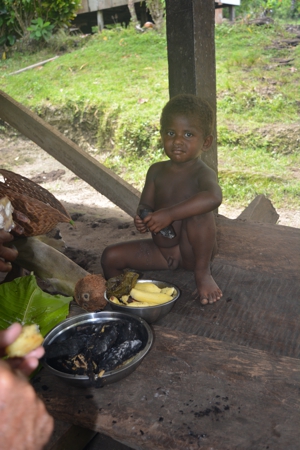 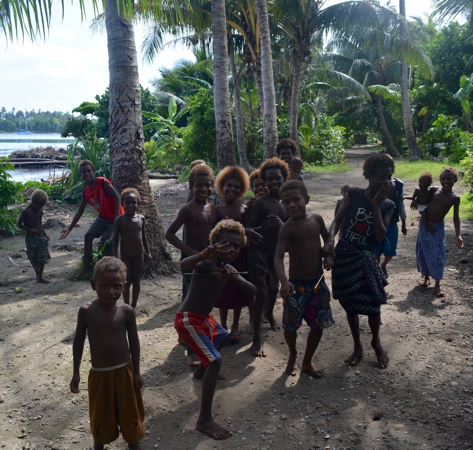 Wesley’s nephew enjoying cooked banana and some of our ‘gang’. As we headed back along the track to our kayak, along with our diminutive escort, we heard a big to-do along the shore. There was chanting and yells and even gun fire. The kids told us to get in the kayak and leave, so we did, paddling out from the shore. Meanwhile about 100 men, along with the masked man, came running along the path into the village. Some had machetes, some had guns. Men came running from all over the place to meet them - throwing rocks and branches and firing guns of their own. The women and children scattered. We paddled over to the other side of the anchorage where some women and children were watching from the shallows and the situation was explained to us by a teacher, Christa, who was there with her small son. The Duk Duk masked man had been going to the other village and extracting shell money payments, for whatever secret reason. Christa said it happens about four times a year. But this village had asked the mask not to come today because of the kaikai, they needed their shell money for transactions during the feast, they asked not to be bothered today. The mask village took offence, saying that they were disrespecting the Duk Duk and gathered all the men together to attack. Christa was really concerned that they would burn down houses and that someone would be killed - she said they get drunk and this happens about once a year. We could see a fight going on along the shore, machetes and gun barrels catching the sun, stones being thrown, the roar of voices rising and falling. We asked about the police but Christa said there’s just one policeman on the island and he’d not interfere in Duk Duk business. Whilst this was occurring people started arriving by local dinghy to come to the feast. Christa and the others would call out to them and signal to them not to land, they stayed out in the bay worried that their boats would be attacked. Scary stuff. After an hour or so it all quietened down and the attacking men left. Christa thought shell money had been paid. A few hours later the police did arrive - we were watching from on deck. Three came in uniforms carrying rifles and spoke with groups of people, first the men, then the women. All the boats were taken off the shores and put on lines in the water, even the ones with no engine, ready for a quick getaway if needed. People arrived with baskets of food for the kaikai but sat on the sand close to the boats and put the food back on board. We’re watching and waiting but we’ll leave at first light. This is no place for dim dims.  One of our escort showing off his pop gun, a tube is made made by sliding the thick bark off the hard inner wood of a stick, then forcing a seed into the end. You push the stick back inside the bark tube and - pop! The seed shoots out. We saw flutes made from the same sticks in the Caribbean. Happily these guns only shoot seeds, unlike the ones the grownups had. |